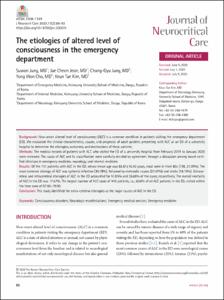KUMEL Repository
1. Journal Papers (연구논문)
1. School of Medicine (의과대학)
Dept. of Emergency Medicine (응급의학)
The etiologies of altered level of consciousness in the emergency department
- Keimyung Author(s)
- Jeon, Jae Cheon; Jung, Chang Gyu; Cho, Yong Won; Kim, Keun Tae
- Department
- Dept. of Emergency Medicine (응급의학)
Dept. of Internal Medicine (내과학)
Dept. of Neurology (신경과학)
- Journal Title
- Journal of Neurocritical Care
- Issued Date
- 2020
- Volume
- 13
- Issue
- 2
- Keyword
- Consciousness disorders; Neurologic manifestations; Emergency medical services; Emergency medicine
- Abstract
- Background:
New-onset altered level of consciousness (ALC) is a common condition in patients visiting the emergency department (ED). We evaluated the clinical characteristics, causes, and prognosis of adult patients presenting with ALC at an ED of a university hospital to determine the etiologies, outcomes, and destinations of these patients.
Methods:
The medical records of patients with ALC who visited the ED of a university hospital from February 2019 to January 2020 were reviewed. The cause of ALC and its classification were carefully decided by agreement through a discussion among board-certified clinicians in emergency medicine, neurology, and internal medicine.
Results:
Of the 731 patients with ALC in the ED, whose mean age was 68.81±16.40 years, most were in their 80s (198, 27.09%). The most common etiology of ALC was systemic infection (30.78%), followed by metabolic causes (21.07%) and stroke (18.19%). Extracerebral and intracerebral etiologies of ALC in the ED accounted for 51.85% and 26.68% of the cases, respectively. The overall mortality of ALC in the ED was 17.67%. The largest number of ALC cases of 443 patients, i.e., 60.6% of all ALC patients in the ED, visited within the time zone of 07:00–19:00.
Conclusion:
This study identified the extra-cerebral etiologies as the major causes of ALC in the ED.
- Publisher
- School of Medicine (의과대학)
- Citation
- Suwon Jung et al. (2020). The etiologies of altered level of consciousness in the emergency department. Journal of Neurocritical Care, 13(2), 86–92. doi: 10.18700/jnc.200010
- Type
- Article
- ISSN
- 2508-1349
- Source
- https://www.e-jnc.org/journal/view.php?number=326
- 파일 목록
-
-
Download
 oak-2020-0656.pdf
기타 데이터 / 766.71 kB / Adobe PDF
oak-2020-0656.pdf
기타 데이터 / 766.71 kB / Adobe PDF
-
Items in Repository are protected by copyright, with all rights reserved, unless otherwise indicated.